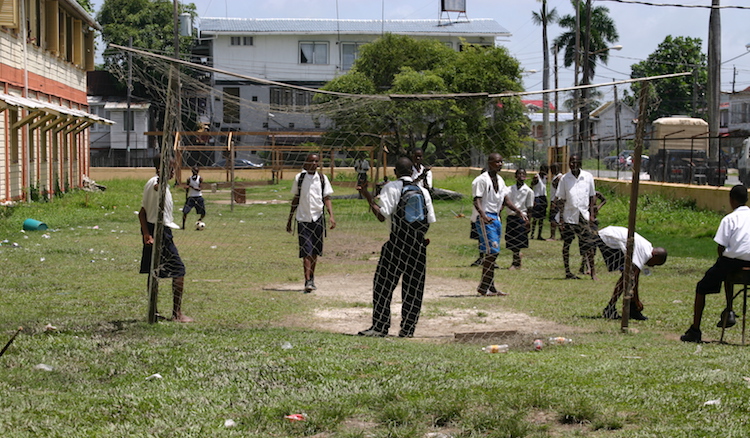By Desmond Brown
GEORGETOWN, Guyana (IDN) – Investing in sport can help reduce spiralling health costs and promote education, social cohesion and gender equality, says a new guidebook published by The Commonwealth.
The recommendations of the guidebook, titled ‘Enhancing the Contribution of Sport to the Sustainable Development Goals’, are important to the Caribbean, where chronic and communicable diseases are devastating to individuals and community, threatening the quality of life and becoming an increasingly negative factor in the region’s development.
Guyana, for example, spends on average 4.6 per cent of its gross domestic product (GDP) on healthcare every year, equivalent to 200 dollars per capita
The guidebook, which recognises the potential contribution of sport to achieving important development objectives, including the 17 Sustainable Development Goals (SDGs) of the United Nation’s 2030 Agenda for Sustainable Development, was published to coincide with International Day of Sport for Development and Peace on April 6, and lists a set of policy prescriptions designed to help countries achieve global targets in health, education, social inclusivity and gender equality by using sport as a tool.
One of the areas identified where sport can make an enormous impact is in improving public health.
In the Western hemisphere, the epidemic of chronic disease has most affected the Caribbean region. The Pan American Health Organisation (PAHO) has noted that “the Caribbean has the highest death rates from heart disease and the top five countries for diabetes in the Americas.” Among the countries in the Caribbean Community (CARICOM), heart disease ranks as the leading cause of death. Other conditions such as cancer, stroke, diabetes and HIV are major causes of death.
The Commonwealth guidebook notes that physical inactivity causes more than three million deaths per year globally, and accounts for 1-4 percent of all healthcare costs. Despite the benefits of adopting an active lifestyle, one-fifth of men and one-quarter of women do not meet World Health Organisation (WHO) minimum guidelines for physical activity, according to which adults should practise 75 to 150 minutes of exercise a week.
The guidebook’s recommendations include ring-fencing education budgets for school sports and physical education; regulating to preserve green spaces in towns and cities for sports and physical activity; funding new sports facilities through private and civil society partnerships; and creating small ‘pocket parks’ for dance and informal exercise.
It also recommends ensuring that sport facilities are safe and accessible for women and girls; training the sport workforce, including coaches and volunteers, to help people from diverse backgrounds become physically active; developing initiatives to boost sport-based entrepreneurship and enterprise; and implementing measures to safeguard all children participating in sport.
The guidebook carries a stark warning that the benefits of investing in sport will be eroded if corruption and exploitation in sport is allowed to persist, and calls for the obligation of sports organisations to meet international standards on good governance and child safeguarding as a condition for receiving any public funds.
The Commonwealth guidebook was developed with researchers from Durham University in the UK, Dr Iain Lindsey and Professor Tony Chapman, along with sports experts and organisations, and policy-makers from government ministries in Australia, Botswana, Sierra Leone and Zambia.
It follows the historic commitment made by more than 30 governments at the Commonwealth Sports Ministers Meeting in August 2016 to ensure that national sports policies are aligned to deliver the SDGs.
“By increasing access to and participation in quality and inclusive sport we can improve people’s health and education, break down social barriers and ultimately save public money,” said Head of Sport for Development and Peace at the Commonwealth Secretariat, Oliver Dudfield.
“This guidebook presents wide-ranging policy options for governments where there is evidence that sport and physical activity can help to deliver sustainable development. The recommendations we are putting forward aim to deliver on the promise of sport as a potential development tool.”
Meanwhile, at a meeting on April 11 at the Georgetown headquarters of the CARICOM Secretariat, the Secretary-General of CARICOM, Ambassador Irwin LaRocque, and the president of the Federation of International Football Associations (FIFA), Giovanni Infantino, agreed on the importance of sport to youth development and to society as a whole.
Stressing that sport is valuable as a social investment which could assist in channelling youth towards positive endeavours, LaRocque noted that the Caribbean Community was preparing a Human Resource development Strategy in which sport was an important element given the holistic nature of the development process. [IDN-InDepthNews – 15 April 2017]
Related link: Sport and Sustainable Development Goals
Photo credit: The Commonwealth
IDN is flagship agency of the International Press Syndicate
facebook.com/IDN.GoingDeeper – twitter.com/InDepthNews

